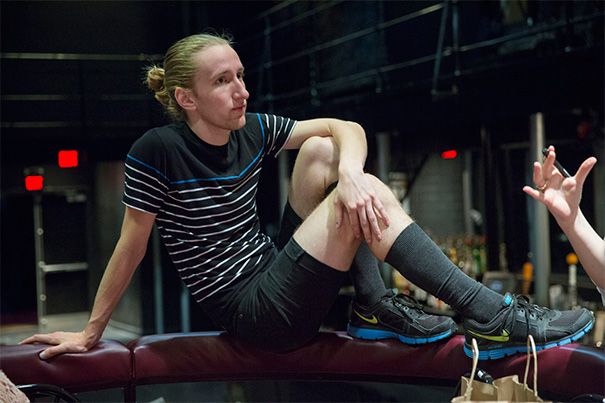
“My hope for the audience … is that we kind of surprise you with where we go,” said Mark Mauriello ’15 of the Oberon production of his original play “OSCAR at The Crown and the love that dare not speak its name.”
Kris Snibbe/Harvard Staff Photographer
The importance of being earnest
Theater devotee Mark Mauriello ’15 says goodbye to Harvard with his thesis show about Oscar Wilde
On Saturday nights, Mark Mauriello ’15 sprinkles an eerie magic in Oberon, the black-box space of the American Repertory Theater (A.R.T.). Painted in gold and green, dusted in glitter, and swirling on roller skates, Mauriello portrays Dr. Wheelgood, a fairy-like creature with a love of foreign substances in “The Donkey Show,” Diane Paulus’ disco-inspired version of Shakespeare’s “A Midsummer Night’s Dream.”
But this week, Mauriello will forego his skates for a turn as playwright and author Oscar Wilde during a three-night run at Oberon of his show “OSCAR at The Crown and the love that dare not speak its name.” The production, his senior project, is the culmination of his four years in Cambridge, he said, where he crafted his own concentration in theater arts and performance and immersed himself in Harvard’s rich arts scene, working closely with the A.R.T. and the Harvard-Radcliffe Dramatic Club.
“It’s like a combination of the work that I’ve done here in my special concentration,” said Mauriello, “living between a world of theater and theater studies, dramatic-arts courses and dramatic literature courses in the English department, and also taking some art-history courses, and VES [visual and environmental studies] courses that are studio-based.”
It was one of those courses that led him to Wilde, in a sophomore seminar that explored his work and his successful yet tragic life. The story was meant for the stage, said Mauriello, whose play opens on Wilde at the height of his career and charts his destruction following three very public trials, his conviction in 1895 for gross indecency for having sexual relations with a man, and his sentence to two years of hard labor. One of the show’s main themes, said Mauriello, is the notion of the public versus private persona, and how far people go to control their image: “In the beginning of the play, Wilde is at his peak. He has immense control over himself and the way he was being perceived by others, and the way he interacted with the world.”
Mauriello, who also directs the show, thinks the piece will resonate with audiences familiar with the ubiquitous form of self-expression known as the selfie, and the desire to present a picture-perfect image to friends, relatives, and even strangers via social media. But he also hopes to offer them something unexpected. “The idea behind the show is that as [Wilde’s] life and his world begin to deteriorate, the show starts to deteriorate,” Mauriello said.
The first act opens with a party-like atmosphere. Singers and dancers appear onstage alongside Wilde, who acts as if “he owns the room.” Once the party devolves, a brief video interlude fills in the story of Wilde’s three trials. In the third act, the dancing girls, electronic music (composed by Mauriello’s friend Andrew Barret Cox, an Emerson College graduate), and flashing lights are gone. In their place is Mauriello, alone on stage with a piano.
“Even the theatrical structure, like character, get teased apart,” said Mauriello, who wants to leave his audiences wondering, “Is that Oscar Wilde? Is that an actor playing Oscar Wilde? Is that Mark?
“My hope for the audience … is that we kind of surprise you with where we go.”
Mauriello’s concentration looks a lot like the new theater, dance, and media concentration recently approved by members of Harvard’s Faculty of Arts and Sciences. He said he likely would have chosen that option had it been available when he was a sophomore, but Harvard’s flexibility and support enabled him to chart his own artistic course regardless.
“I feel like I’ve found the right path, and looking back it was exactly the right thing for me. It feels good to get to the end and think, ‘OK, I think I did it right.’”
Still, Mauriello is thrilled for the students coming up behind him who can take advantage of the new concentration.
“Harvard has done so much for the arts, especially in recent years, to recognize them and to elevate them and make them an important part of our culture … I think just putting them on this equal plane with other academic fields says a lot.”
“OSCAR at The Crown and the love that dare not speak its name” runs April 15 and 16 at 8 p.m. and April 17 at 10:30 p.m.




